Births
This section is empty.You can help by adding to it.(January 2012) |
This section is empty.You can help by adding to it.(January 2012) |
This section is empty.You can help by adding to it.(January 2012) |
| This year in poetry article is a stub. You can help Wikipedia by expanding it. |
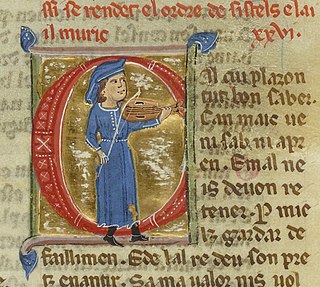
A troubadour was a composer and performer of Old Occitan lyric poetry during the High Middle Ages (1100–1350). Since the word troubadour is etymologically masculine, a female troubadour is usually called a trobairitz.

The Eighth Crusade was a crusade launched by Louis IX of France against the city of Tunis in 1270. The Eighth Crusade is sometimes counted as the Seventh, if the Fifth and Sixth Crusades of Frederick II are counted as a single crusade. The Ninth Crusade is sometimes also counted as part of the Eighth. The crusade is considered a failure after Louis died shortly after arriving on the shores of Tunisia, with his disease-ridden army dispersing back to Europe shortly afterwards.

The Seventh Crusade was a crusade led by Louis IX of France from 1248 to 1254. Louis' troops were defeated by the Egyptian army led by Fakhr al-Din ibn Shaykh al-Shuyukh, whose army was supported by the Bahriyya Mamluks led by Faris ad-Din Aktai, Baibars al-Bunduqdari, Qutuz, Aybak and Qalawun. Sheikh Al Shioukh was killed in the war, and Louis was captured, approximately 800,000 bezants were paid in ransom for his return.
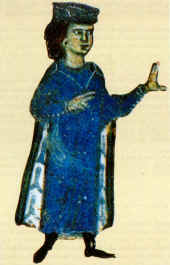
William IX, called the Troubador, was the Duke of Aquitaine and Gascony and Count of Poitou between 1086 and his death. He was also one of the leaders of the Crusade of 1101. Though his political and military achievements have a certain historical importance, he is best known as the earliest troubadour—a vernacular lyric poet in the Occitan language—whose work survived.
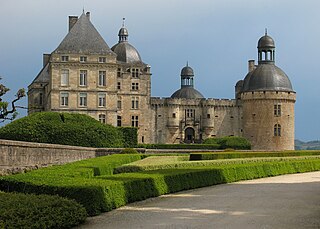
Hautefort is a commune in the Dordogne department in Nouvelle-Aquitaine in southwestern France.
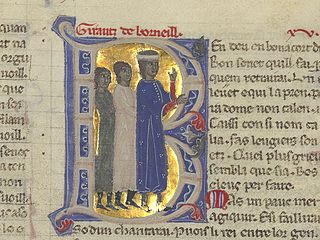
Giraut de Bornelh, whose first name is also spelled Guiraut and whose toponym as de Borneil or de Borneyll, was a troubadour connected to the castle of the viscount of Limoges. He is credited with the formalisation, if not the invention, of the "light" style, or trobar leu.
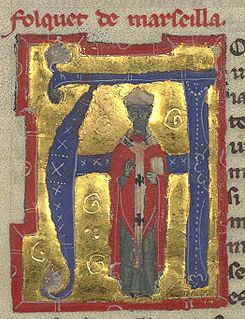
Folquet de Marselha, alternatively Folquet de Marseille, Foulques de Toulouse, Fulk of Toulouse came from a Genoese merchant family who lived in Marseille. He is known as a trobadour, and then as a fiercely anti-Cathar bishop of Toulouse.

Gaucelm Faidit was a troubadour, born in Uzerche, in the Limousin, from a family of knights in service of the count of Turenne. He travelled widely in France, Spain, and Hungary. His known patrons include Geoffrey II, Duke of Brittany and Dalfi d'Alvernha; he was at one time in Poitiers at the court of Richard I of England, for whose death he wrote a famous planh (lament) in 1199. It is possible, but controversial, that Gaucelm took part in the Third Crusade from 1189–1191; it seems clear that in 1202 he set out on the Fourth Crusade, as did his current patron, Boniface of Montferrat. After 1202 there is no further historical trace of him.

Raimbaut de Vaqueiras or Vaqueyras was a Provençal troubadour and, later in his life, knight. His life was spent mainly in Italian courts until 1203, when he joined the Fourth Crusade.
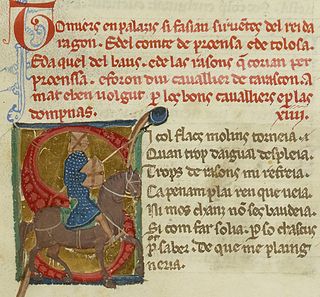
Tomier and Palaizi were two knights and troubadours from Tarascon, possibly brothers, and frequent comrades and co-composers.

Lanfranc Cigala was a Genoese nobleman, knight, judge, and man of letters of the mid thirteenth century. He remains one of the most famous Occitan troubadours of Lombardy. Thirty-two of his poems survive, dealing with Crusading, heresy, papal power, peace in Christendom, and loyalty in love. Lanfranc represented a tradition of Italian, Occitan-language trovatori who berated the Papacy for its handling of the Crusades.

Peirol or Peiròl was an Auvergnat troubadour who wrote mostly cansos of courtly love in the late twelfth and early thirteenth centuries. Thirty-four surviving poems written in Occitan have been attributed to him; of these, seventeen have surviving melodies. He is sometimes called Peirol d'Auvergne or Peiròl d'Auvèrnha, and erroneously Pierol.

Perdigon or Perdigo was a troubadour from Lespéron, diocese of Gévaudan. Fourteen of his works survive, including three cansos with melodies. He was respected and admired by contemporaries, judging by the widespread inclusion of his work in chansonniers and in citations by other troubadours.
Bertran d'Alamanon, also spelled de Lamanon or d'Alamano, was a Provençal knight and troubadour, and an official, diplomat, and ambassador of the court of the Count of Provence. Twenty-two of his works survive, mainly provocative tensos and sirventes, many dealing with Crusading themes.
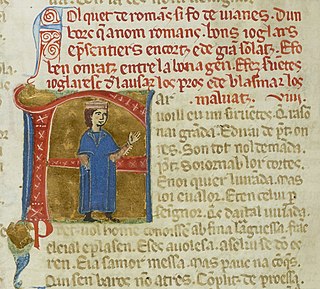
Falquetde Romans was the most famous troubadour attached to the court of Frederick II, Holy Roman Emperor, where he garnered a high reputation despite the fact that his career began as a jongleur. His surviving work consists of fourteen or fifteen pieces: seven sirventes, three tensos, two or three cansos on courtly love, a salut d'amor of 254 lines, and a religious alba. His poetry is, in general, clear and elegant, and he was apparently very religious.
Austorc d'Aorlhac or Aurilhac was an Auvergnat troubadour from whom only one sirvente survives. He was from Aurillac.
Austorc de Segret or Austau de Segret was an Auvergnat troubadour with only one surviving sirventes, "No sai quim so, tan sui desconoissens".
Peire Lunel de Montech, also known as Cavalier Lunel or Peire de Lunel, was a lawyer, politician and author of Toulouse. His name indicates he was a knight from Montech.
Raimon de Cornet was a fourteenth-century Toulousain priest, friar, grammarian, poet, and troubadour. He was a prolific author of verse; more than forty of his poems survive, most in Occitan but two in Latin. He also wrote letters, a didactic poem, a grammar, and some treatises on computation. He was the "last of the troubadours" and represented l'esprit le plus brillant of the "Toulousain School". He appears in contemporary documents with the titles En and Frare.